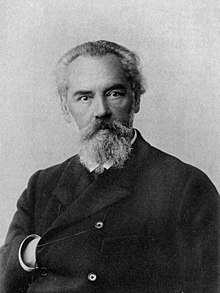Alexander Nikolajewitsch Wesselowski
Alexander Nikolajewitsch Wesselowski , Russian Александр Николаевич Веселовский , English transcription Alexander Veselovsky, (born February 16, 1838 in Moscow , † October 23, 1906 Saint Petersburg ) was a Russian literary scholar.
Wesselowski was a student of Fyodor Ivanovich Buslajew (1818-1898) and studied at Lomonossow University with the degree in 1858. He was then a short time tutor of the son of the Russian ambassador to Spain, studied in Berlin (with Heymann Steinthal ) and Prague and did research in Italy for three years. In 1872 he became a professor at the University of St. Petersburg and headed the Russian Language and Literature Department of the Academy of Sciences.
He was an outstanding representative of comparative literary studies, tracing the motifs and origins of poetry back to folk tales and folk traditions. He was an expert on Slavic, Byzantine and several Western European literatures from different epochs. His research into medieval Italian literature led him to conclude that many of its subjects were imported from the Orient via Byzantium. In the 1860s and 1870s, he developed a theory of the origins of historical myths and, in the 1870s and 1880s, explored the reflection of historical reality in folk tales (such as those of Ivan the Terrible, 1876) and in South Russian epic folk songs (1881-1884). To this end, in the 1890s he developed a synthetic theory of the everyday basis and the psychological basis of folk tales. Among other things, he analyzed Pushkin, Bocaccio, Dante and Petrarca.
In 1876 he became a member of the Russian Academy of Sciences.
Sometimes he worked with his brother Alexei Wesselowski (1843–1918).
In the Soviet Union his work and that of his successors were criticized (as ethnographism and too exclusively aimed at external sources) and condemned, and the Russian formalists were also critical of him.
Fonts
- Istoričeskaja poetika, 1940 (translated into Italian in 1981: Poetica storica)
Web links
| personal data | |
|---|---|
| SURNAME | Wesselowski, Alexander Nikolajewitsch |
| ALTERNATIVE NAMES | Veselovsky, Alexander; Веселовский, Александр Николаевич (Russian) |
| BRIEF DESCRIPTION | Russian literary scholar |
| DATE OF BIRTH | February 16, 1838 |
| PLACE OF BIRTH | Moscow |
| DATE OF DEATH | October 23, 1906 |
| Place of death | St. Petersburg |
